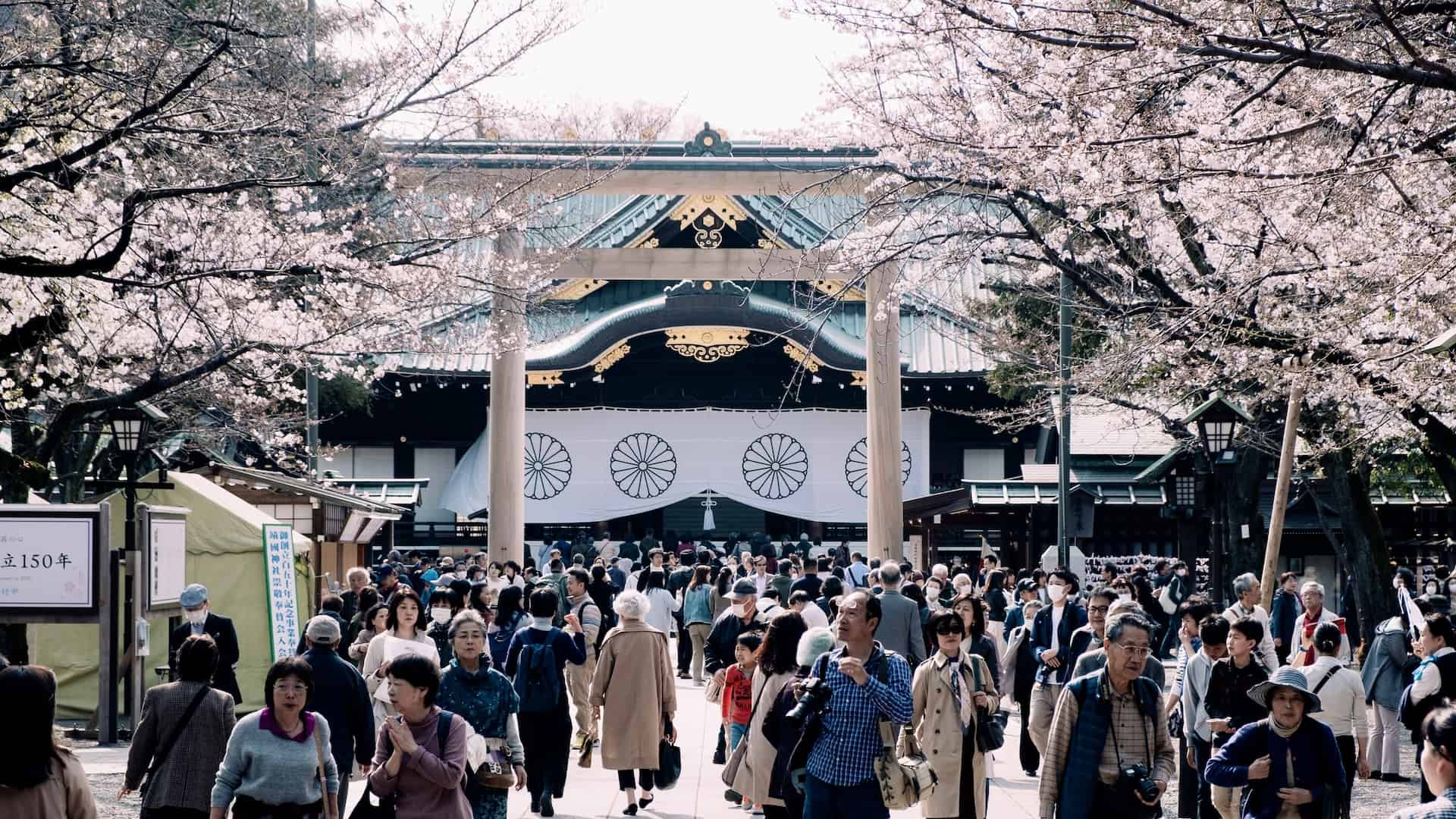
20 Things to Know Before You Travel to Japan
Japan is a fascinating and diverse country that offers a unique experience for every traveler. Whether you are interested in its ancient history, modern technology, or vibrant culture, Japan has something for you. However, before you pack your bags and hop on a plane, there are some things you should know before you travel to Japan. Japan has its customs, etiquette, and rules that may be different from what you are used to. Knowing these things in advance can help you avoid any awkward or embarrassing situations and make your trip more enjoyable and memorable. In this article, we will share with you some of the most important things to know before you travel to Japan, such as what to wear, how to greet, how to dine, and how to get around. By the end of this article, you will be ready to explore Japan like a pro!
1. Learn Some Basic Words
English is quite popular in cities and tourist destinations. However, English is not commonly used, especially in rural areas. Thus, this language may not be useful and communication can be difficult. In addition, most restaurants or vending machines do not provide English menus.
Therefore, if you have the opportunity to visit the Land of the Rising Sun, you should learn some basic phrases as well as notes when communicating, such as:
- Keep your palm open when pointing at something because pointing in Japan is considered rude.
- “Gomen Nasai” (I’m sorry), “Sumimasen” (Excuse me), “Toire” (toilet), “Mochikaeri” (Take away), “Tennai de” (I’m eating here).
- Say “Onegaishimasu” when you need that person’s help.
- To say thank you, you can say “Arigatou gozaimasu”.
2. When You Come to Japan, Don’t Forget to Bow
When traveling to Japan, you need to know the cultures of this place so that you can have an easy trip and not offend the local people. A beautiful feature as well as a principle is the final greeting. In Japan, people often bow when meeting each other to show respect for the other person. So when you meet and interact with Japanese people, don’t forget to bow. This helps you gain a lot of love from the locals, making your trip to Japan much more enjoyable and easier.
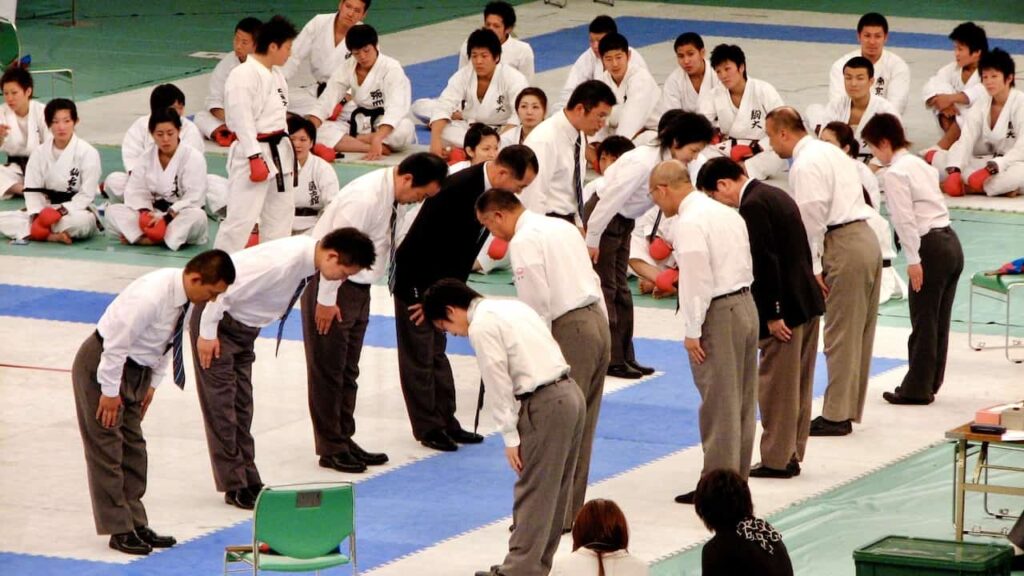
3. What to Wear When Traveling to Japan?
Japanese people dress very neatly and discreetly. Thus, you should avoid clothes that are too revealing or “skimpy”, especially when going to sacred places like temples.
- If you travel in spring or summer, you should bring light, airy, portable clothes. Additionally, you should bring an umbrella, hat, or thin jacket in case the weather changes.
- If you go in the fall or winter, remember to bring clothes, hats, socks, and scarves to keep your body warm, especially in the winter because snow in Japan makes it very cold.
Rain is quite a lot in Japan. The country is also home to vast, lush forests and many impressive landscapes. However, remember to bring an umbrella to prevent sudden rain.
In addition to preparing clothes, sneakers are always the number 1 companion on all trips. Avoid bringing high heels, which are both inconvenient and prone to accidents (such as tripping, or twisting your feet) when moving. A few small accessories such as sunglasses (if going in the summer), a scarf, a hat, and gloves are also very useful.
4. Take off Your Shoes Before Entering the House
Houses in Japan are completely different from many places in the world. They are built of wood and have high steps. Hence, if you visit any locals’ houses, don’t forget to take off your shoes and leave them outside. There will usually be separate slippers in the house, otherwise you should walk in places covered with tatami mats. Some restaurants or temples in Japan also apply these rules.
4.1. Wear Shoes That Are Easy to Take Off
Besides the comfort factor, you should choose shoes that are easy to take off. Coming to Japan, you often visit religious attractions, and traditional inns and eat at restaurants, these spots often require removing outside shoes and sandals and using separate slippers. You can wear socks to avoid contact when sharing slippers with others.
5. Always Carry Your Passport with You
Many people choose to leave their passports in a safe at their hotel or hostel when exploring a new city. While this is often the safer decision, in Japan the law requires foreign tourists to carry their passports at all times. This is required by the Japanese authorities, who have the right to stop you and ask for this identification.
Besides that, the benefit of carrying a passport is that when you shop in stores in Japan and spend over 5,000 Yen, you will be able to claim a tax refund. You then need to present your passport when paying to verify and record it.
6. Learn How to Use the Bidet Toilet
In Japan, electronic toilets are very popular with the cleaning function at the push of a button. Although there are some language barriers, using this toilet is relatively simple.
In addition, some features of Japanese restrooms can also confuse visitors. For example, sound machines activated by motion sensors in women’s restrooms help to hide sensitive noises. The restrooms also often lack towels and do not have hand dryers, so you need to proactively prepare.
7. No-tip Culture
Japanese people are extremely respectful of the work they do (indeed, that includes girls working in the night entertainment industry), and almost absolutely do not accept the culture of tips. Therefore, you should not show generosity in restaurants, hotels, etc. because it may hurt their employees.
8. Don’t Eat While Walking
In Japan, one of the subtle things that everyone should know is not to eat while walking. This is considered rude due to the belief that doing another activity while eating means you don’t appreciate or don’t want to enjoy the food.
Therefore, when buying food at the market or roadside store, remember to sit on a bench or wait until you are standing still before starting to enjoy.
9. How to Dine
In Japan, eating is always an art and the chef is a true artist. Not only does the chef cook the dishes but he also puts his heart and soul into the dishes. Often before eating, Japanese people put their hands on their chest and say “Itadakimasu” which means receive and thank someone for the meal. After finishing eating, say “Gochisosama” as a thank you to the person who made that good dish for you.
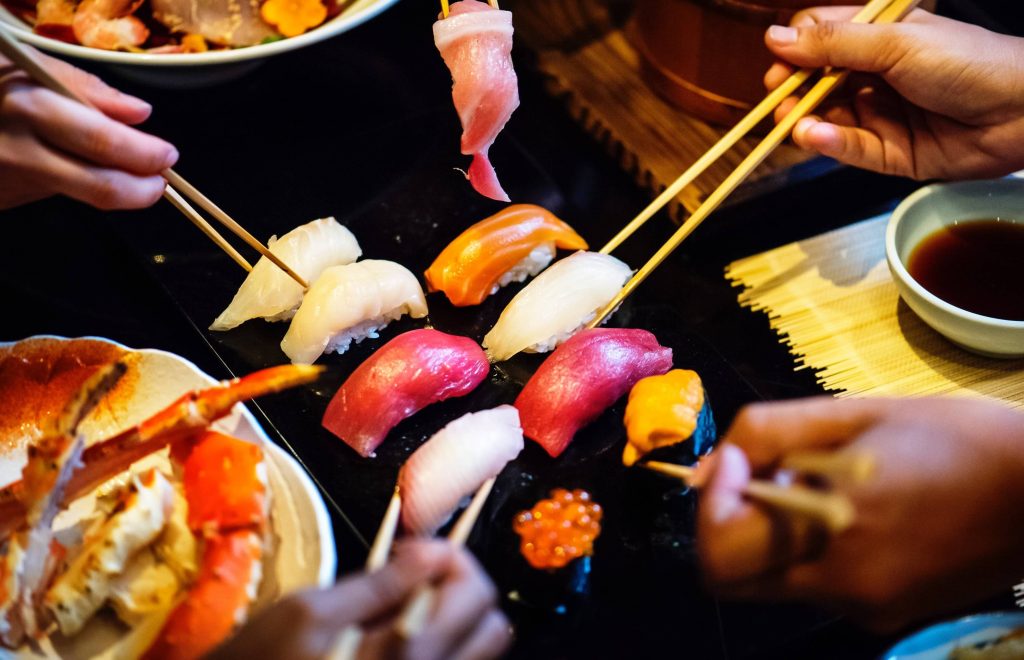
10. Bring Cash
If traveling to rural areas, credit cards or electronic payments may not be accepted. Therefore, you should prepare cash. The “standard Japanese” way to pay is to put money or cards in the tray next to the cash register instead of paying directly to the cashier.
Besides, Japanese people also do not have a culture of receiving tips. In the bill, restaurants typically add a “flat service fee” of about 10-15 percent. It’s usually mentioned in the menu and will be added to your bill.
The Yen currently has 10 denominations, divided into 2 types: paper money and coins. 1 USD is equivalent to about 145 Japanese Yen. Coins include 1 Yen, 5 Yen, 10 Yen, 50 Yen, 100 Yen, and 500 Yen. Paper currencies include 1000 Yen, 2000 Yen, 5000 Yen, and 10,000 Yen notes.
10.1. The ATM May Not Accept Your Card
In Japan, many ATMs are only available with Japanese credit and debit cards. Not only that, convenience stores and supermarkets don’t allow you to withdraw cash back. Therefore, when traveling in Japan, you should bring cash for convenient spending. Otherwise, you can go to 7-Eleven convenience stores in Japan to withdraw cash as well as enjoy delicious food!
11. Things to Note When Shopping in Japan
Shopping is something that no tourist can miss if they have the opportunity to travel to Japan. However, there are also points to keep in mind when shopping to avoid becoming “ungainly” in the eyes of local people as follows.
- Don’t bargain when shopping in Japan: All items in Japan have listed prices clearly and sellers don’t have the habit of setting “sky-high” prices. Therefore, when shopping, just look at the price list and buy if it fits your budget, without having to bargain too much.
- Don’t secretly try something in the supermarket: This is a taboo in Japanese culture. If you want to buy something as a gift and don’t know the quality, it’s best to ask the locals for advice. They will be happy to give you advice. Don’t try it yourself. If you are recorded by a camera, your image will immediately appear on the big screen for everyone to “admire”.
- Don’t tamper with items in the self-service store: If you don’t like the item you just put in your cart, put it back in its original location.
- You must pay consumption tax when buying things in Japan: All items in Japan are charged a 10% consumption tax. Don’t be surprised when this item appears on your payment invoice! Yet, you can get a refund if the bill is over 5,000 Yen and record the transaction with your passport.
12. Buy a SIM with High Data Capacity
Addresses in Japan are notoriously difficult to navigate, even for locals. Therefore, you should buy SIM cards with high data capacity to use for positioning during travel.
Buying a SIM in Japan is not simple. Phone SIMs in Japan are encrypted for certain networks. In addition, to buy a phone SIM in Japan, buyers have to go through very complicated procedures, so the best way is to buy a SIM at a reputable dealer and ask them to help activate the SIM when you pick it up. The cost of a Japanese SIM is about USD 20.
Alongside, free Wi-Fi in Japan is like a scarce commodity. At most, you can only use free Wi-Fi in restaurants or hotels. Otherwise, you can rent a pocket Wi-fi router to enjoy unlimited Internet access and always stay connected.
13. Always Keep to the Left When Traveling to Japan
Japan is one of the few Asian countries that drives on the left. You should pay attention to this when moving here. In Tokyo, one of the most populous cities in the world, the special thing is that traffic jams never occur because people here are extremely conscious.
Particularly for escalators in Japan, you will stand on the left and walk on the right. You need to keep this in mind so you don’t experience inconvenience during your move.
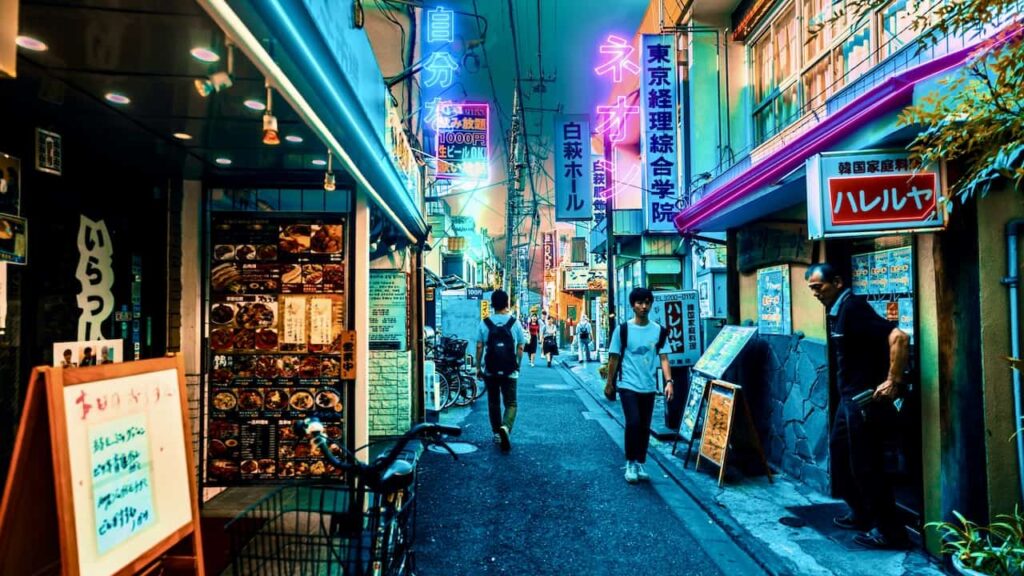
13.1. Which Side Do You Stand On?
When using the escalator, you must always stand on one side, depending on the location. For example, in Kanto and the eastern region, it’s on the left but in Kansai and the western region, you need to stand on the right.
14. Maintain Order and Hygiene in Public Places
Japanese people are very conscious of maintaining general hygiene and public order. You need to be careful not to talk loudly in public places. Maintaining general hygiene is something you must not forget when coming to Japan. Although you will have to struggle to find a public trash can here, please be patient and do not throw trash around.
You can listen to music and play games on the subway, but you absolutely cannot eat on it. Also, be careful about sitting cross-legged, the Japanese view this as impolite.
14.1. Japan is a Clean Country…but Has Very Few Trash Cans
The reason is that in 1995 in Tokyo, there was an extremely dangerous Sarin gas attack that injured more than 5,000 people. The reason comes from the fact that this toxic substance was hidden inside the trash. As a result, the government has removed many trash bins, especially at train stations. Although this may cause discomfort for tourists, it is a fairly understandable move from the Japanese government to protect Japanese people and tourists traveling here.
So what can we do to recycle or properly dispose of trash while in Japan? Look for recycling bins located right next to vending machines and parks, convenience stores, and train stations.
15. Make a Reservation in Advance and Arrive on Time
You should book accommodation early, especially on peak occasions. For instance, the first week of January, the cherry blossom festival (late March to April depending on the time), and golden week (April 29 – May 5) or August.
Particularly, arriving on time is important if you stay in Ryokan (traditional Japanese inns) because they often have fixed check-in times. After this time, staff may be absent and rooms may not be cleaned.
Below are some tips when booking a hotel room in Japan:
- If you want to save money, book a room 3 months in advance before getting a nice place and an affordable price. You should book a room near the bus station or MRT station for convenience. This can be easily found on maps.
- Hotels in Tokyo are often quite expensive. In my opinion, people should rent in Osaka or Kyoto for better prices.
- Stay as close to as many restaurants as possible. Experiencing Japanese cuisine at local shops will be much more interesting.
16. Prepare Your Luggage
Rooms in Japan are often small, especially in big cities, so there isn’t much room for bulky suitcases. In addition, carrying large suitcases also causes inconvenience for you when using public transportation. You should pack light luggage when traveling to Japan.
Religious attractions such as Buddhist temples or Shinto shrines often do not have a dress code. High-end restaurants, bars, and clubs sometimes have some rules, but they usually only require not wearing tank tops or sandals. However, eating on the floor in Japan is quite common, so you need to consider choosing comfortable clothes and avoid tight, short clothes.
Read more: Suitcase Travel Tips Everyone Should Know
17. Morning in Tokyo
For Tokyoites, going to work in the morning is no different from playing sports. On weekdays, from 7:30 a.m. to 9:00 a.m., millions of people crowd onto trains in the city. Sometimes, station staff must assist to ensure everyone has a seat. Shinjuku Station is famous for being the busiest in the world, welcoming an average of 3.5 million passengers daily and having more than 200 entrances and exits.

18. Other Differences in Japanese Culture
When visiting a foreign country, cultural differences are inevitable. Please note the following differences in Japanese culture to avoid being surprised when coming here:
- Reserve your seat in a restaurant with your bag, loyalty card, wallet, or phone. Japanese people use these things to reserve seats in restaurants, so if you see them placing these items, don’t sit in these positions!
- Always adhere to the principle “Customer is king”.
- Signs appear everywhere, so if you need to find your way somewhere, it will be very convenient, right?
- There is no staff to collect bus fares. Yes, buses in Japan do not have bus attendants, but when getting on the bus, customers will have to put money in a small box near the driver.
- Cross the street at the right place.
- Do not smoke or litter.
- Do not jostle or push when queuing.
- Don’t point your finger directly at others.
- Do not sit cross-legged.
- Don’t eat while walking.
- Do not spit indiscriminately on the street.
- Do not wear swimsuits when bathing in hot springs.
19. Means of Transportation in Japan
Most Japanese people use public transportation to get around. If you want to experience modern public transportation at an affordable cost, you can also refer to the means below.
19.1. Japanese High-speed Railway
The most popular train in Japan is the Shinkansen the “bullet” train, which is one of the world’s fastest high-speed trains. Shinkansen trains connect major cities in Japan with a nationwide rail network. With only about 13,000 Yen, you can travel from Tokyo to Osaka in only about 3 hours because the train speed can be up to 320km/h.
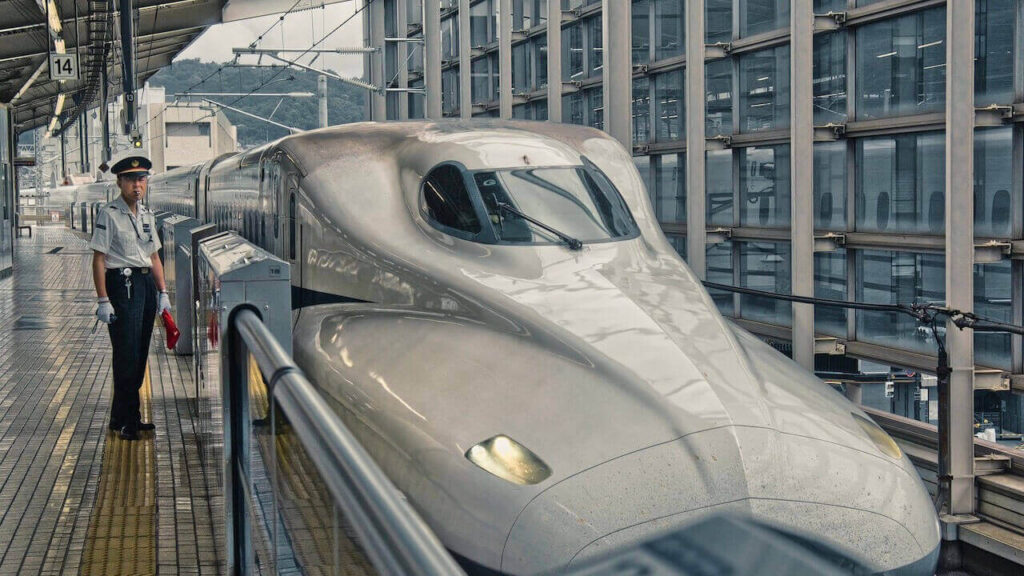
19.2. Metro and Subway
The subway is one of the most popular means of transport for Japanese people because of its convenience, punctuality, and reasonable price. If you’re in Tokyo or Osaka, you can travel comfortably between locations by subway for only about 600 Yen.
The metro in the city runs until 1 a.m. at the latest. If you miss this trip, your only option is to call a taxi and that will be quite expensive.
19.3. Taxi
Taxis are the most expensive means of transport in the land of the rising sun. In big cities like Tokyo, the price will range from 600 – 700 Yen for the first 2km and 300 Yen for each subsequent kilometer.
The price of traveling by taxi in Japan is quite high, so you should only use taxis when there is no other choice.
19.4. Bus
This is also a reasonable choice for those who want to save money when traveling to Japan on their own. Buses are the most economical means of public transportation in Japan, you can ride the bus all day for only about 150 Yen. In addition, the bus system in Japan also allows tourists to travel to different cities with long-distance prices ranging from 3,000 – 5,000 Yen.
20. Unlimited Travel by Rail in Japan, Why Not!
Japan has a great treat for tourists called the Japan Rail Pass and it’s only available to foreign tourists traveling in Japan. Here, high-speed train tickets are sometimes more expensive than plane tickets. Therefore, this is truly an extremely attractive offer for tourists.
The Japan Rail Pass has several different types of tickets depending on how long you stay in Japan. You can choose to buy 7 days, 14 days, or 21 days. If you’re just staying in Tokyo, the Japan Rail Pass will probably be quite a waste, but if you’re visiting nearby cities like Kyoto or Osaka, using the Japan Rail Pass will be essential and can save you a ton of money. That’s a “decent” amount!
Have a Wonderful Time in Japan!
We hope this article has given you some useful and practical tips and advice on what to know before you travel to Japan. Japan is a beautiful and amazing country that will surely impress you with its charm and hospitality. By following these tips and advice, you will be able to respect and appreciate the Japanese culture and people and have a smooth and hassle-free trip. Japan is waiting for you, so don’t hesitate to book your flight and start your adventure. Have a wonderful time in Japan!
Note:
This post contains affiliate links from which I can earn commissions if you use services or buy products from the blog’s partners. If you love the blog, please use the services or buy the products. In that way, you give me support for the blog’s maintenance and development. I appreciate it a lot and thank you for that!
Hey, I Have Travel Planning Resources Here to Help You Easily Plan Your TripEssential Items
Don't forget to bring the Travel Medicines, as well as your necessary Travel Kit. If Your Next Destination Requires a Visa
IVISA will help you with their speed, simple, and secured services with just a minimal chance of being rejected.
Find Your Flight and Transportation to The Destinations
You can read my travel tips to Find Cheap Flights.
You can also use 12Go to book buses, trains, ferries, or any transportation to places.
Book An Accommodation
I mostly use Booking.com to find a place for my trip. Sometimes I try to Get Free Credits on Airbnb to book homestays. Driving Yourself Will be More Enjoyable
You can easily compare prices and find great deals on Discover Cars.
Protect Yourself and Your Trip
Travel Insurance is Important, especially after COVID-19, there are more possible health issues and pandemics. Please don't forget to have a shield for yourself and your trips!
‘PIN IT’ NOW TO SAVE YOUR TIPS OF THINGS TO KNOW BEFORE YOU TRAVEL TO JAPAN
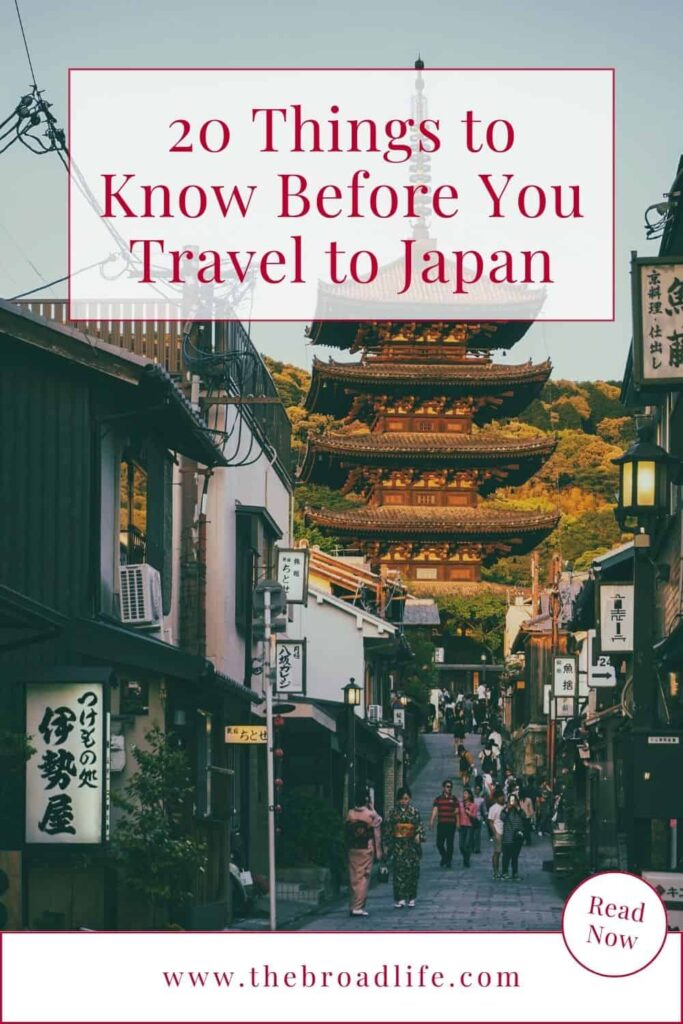
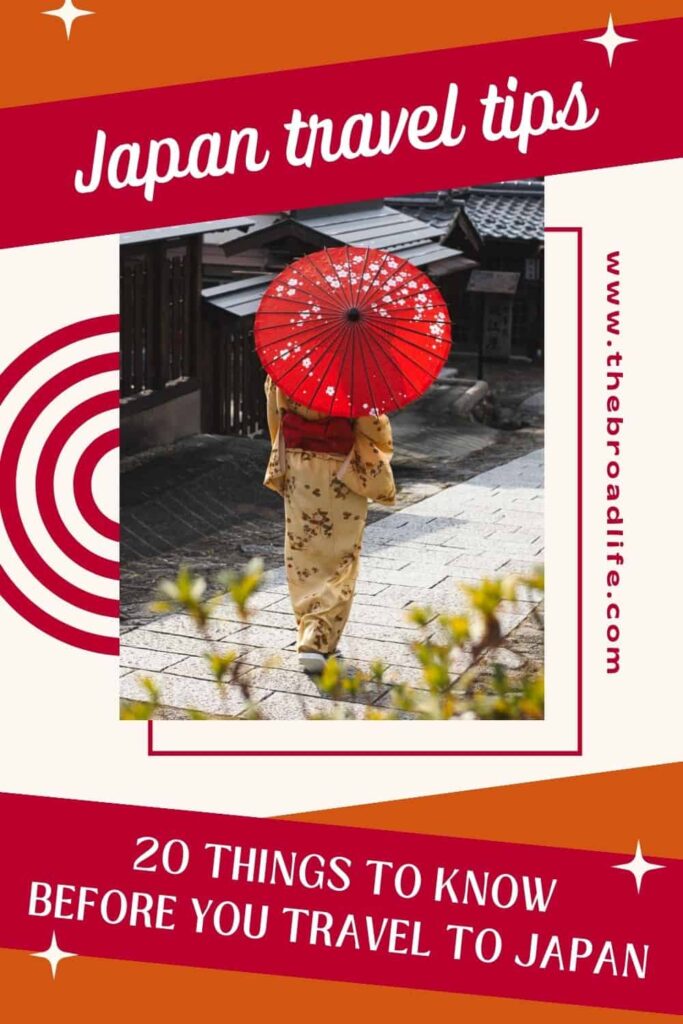
10 Comments
-
Claudia
I love this guide so much. When we visit other places, it’s so important for us to follow their traditions. We’re visitors.
-
Yonca
These are helpful tips for the first time travellers to japan. I’d love to see this amazing country one day.
-
pedja
Non-tiping culture is very interesting. They will get naked and entertain you, but won’t accept a tip. just Ridiculous…
-
Fransic verso
Interesting, didn’t think about what to wear but will keep this in mind for future trips to japan.
-
Elise ho
I want to know everything. I love the tips, ESPECIALLY the FASCINATING one about how to properly eat your food.
-
Gervin Khan
This article is very informative and a great guide for the people who’re reading this, especially those who are planning to go to japan for them to know on what to do.
-
Sonia Seivwright
Japan, here I come! I honestly would love to visit Japan and experience the Japanese traditions.







Stephanie
We’ve wanted to plan a trip to Japan for many years, so I really appreciated the tips on visiting this beautiful country. SAving this for our future travel plans!